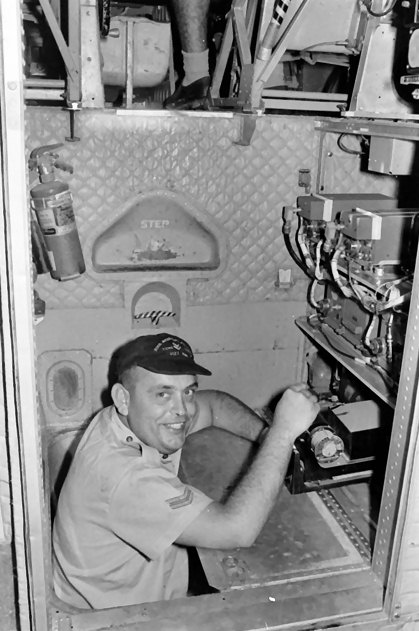
|
Vol 70 |
Page 10 |
Privacy Policy | Editorial Policy | Profit Policy | Join the Association | List of Members | Contact us | Index | Links
Back Go to page: 1 2 3 4 5 6 7 8 9 10 11 12 13 14 15 16 17 18 19 20 Forward
Contents.
Vietnam re-visited.
(A lot of these pics were sourced from the AWM site.
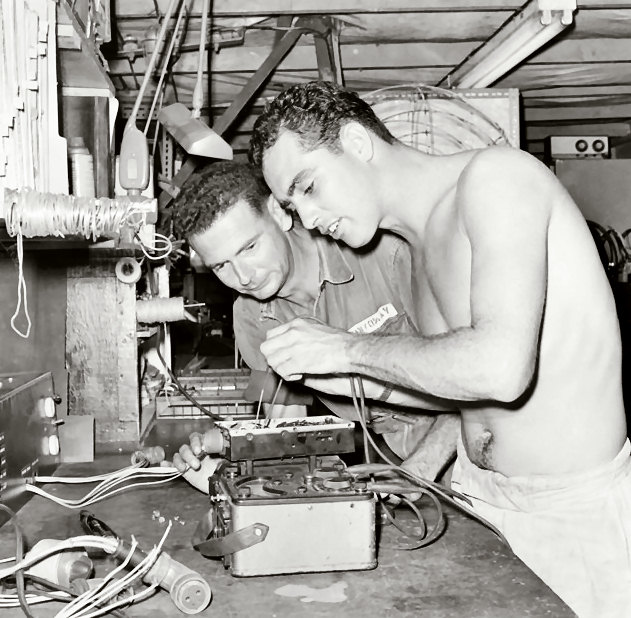
Electrical fitter Tom Van Dyken (left) supervises Ray "Luigi" Hanlon who is testing a Caribou aircraft's inverter which supplies AC power to various instruments. March 1966. (The trusty AVO in the foreground).
|
Electrical fitter, Allan Elliott of 35 Squadron, working on electrical components on one of the Caribous at Vung Tau - November 1966.
Allan was awarded a certificate of “Commendation for Outstanding Service” by the CO of the Squadron, Wng Cdr Charles Melchert, who made the presentation during a parade of the full complement of 35 Squadron, personnel.
The citation for the award reads:
‘Corporal Elliott demonstrated great devotion to duty and a high degree of professional skill in designing and manufacturing test equipment, at the same time as effectively supervising a large squadron electrical section. His initiative, inventiveness, and outstanding efforts have set a high standard example and improved the effectiveness of his squadron’.
|
|
John McDougall, “tinkering” with one of the engines off a Caribou. October 1966.
John McDougall, Sumpie, (seated on the left) and Ian Johnston, Radtech, being served cold drinks on the beach after work??. The villa occupied by the men is only yards from the delightful town (front) beach. A small kiosk along the beach provided refreshments and shady seats as well as friendly service for the Australians. October 1964.
What did you do in the war daddy??
Stu Spinks, Caribou pilot, reading the letter from his girl friend back home, for the 20th time.
Ian Taylor, boss of the radio section at 35 Sqn Vung Tau showing, what looks like a bit out of a foreigner, to a trainee. In August 1966, 35 Squadron were training young local Vietnamese men in trades associated with the aircraft industry. They were trained up to the stage of assistant to an Australian tradesman and sometimes after they have had 12 or 18 months training, they would leave to join the Vietnamese Army or civil airlines. After Vietnam, Ian returned to Australia and took over 38 Sqn radio section.
The late Peter Mansfield, (Framie) of 35 Squadron, shows Vietnamese lad Pham Thai points to look for in fitting a wheel to the undercarriage of a Caribou aircraft, in the hangar at Vung Tau.
|
Len Grinham, (Sumpie) shows Vietnamese Nguyen Van Thu, how to fit spark plugs into a Caribou aircraft engine at the maintenance section of Vung Tau Airfield. |
|
Douglas Ellacott (Sumpie) of 35 Sqn, shows Peter Davidson, (9 Sqn pilot) how to pull a cylinder off a Caribou engine. Why he'd want to know that is anyone's guess.
Colin Knudson (Framie) of 35 Sqn shows some hydraulic bits from the Caribou to trainee Hoang Nam.
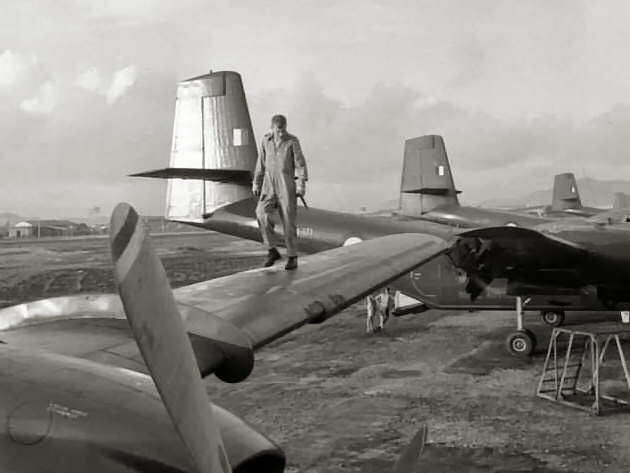
Loady doing preflight.
35 Squadron, Engineering Officer, Herbert (Wally) Solomons, and the CO Charles Melchert, inspecting the crashed Caribou for the extent of damage and to make a list of the parts required to make it airworthy.
The late Keith Bosley, (Loady) hands a Montagnard woman a teddy bear from a collection of toys sent to 35 Squadron by Support Command Headquarters. The Montagnards gathered around the Caribou after it landed at Plei Mrong Airfield with ammunition for the Special Forces Camp based there.
Got an e-mail today from a "bored housewife 32, looking for some action!"
I've sent her my ironing, that'll keep her busy.
An aerial view of the new No 5 Airfield Construction Squadron (ACS) hangar in June 1966. The huts in the background are the headquarters of the various RAAF squadrons operating out of Vung Tau, South Vietnam. The hangar later became the maintenance workshops for 9 Squadron and 35 Squadron.
|
Warren Churchin, (Framie) with 35 Squadron and David Darcey, 9 Sqn crewman and gunner, inspecting the wheels of a Caribou. Dave Darcy carries his issue 9mm pistol in a 'wild west' holster he bought in Vung Tau.
Many of the crewmen bought this type of holster to take back to Australia as souvenirs. |
|
After my wife died, I couldn't even look at another woman for 10 years.
But now that I'm out of jail, I can honestly say it was worth it.
Unloading 9 Squadron helicopters from HMAS Sydney, at Vung Tau Harbour, South Vietnam, June 1966.
Following the arrival of a 9 Squadron advance party on 3 May 1966, the squadron's UH-1B/Iroquois helicopters arrived In Vietnam in June 1966 aboard Sydney which anchored off Vung Tau. The following day, the aircraft were brought up from the hangar deck and had their rotor blades fitted before flying off the aircraft carrier. The squadron moved to Nui Dat at the end of the month. Operating out of Luscombe Airfield at Nui Dat, the Iroquois carried out a variety of roles in Vietnam; primarily the transport of infantry and logistic support, but the helicopters were also used to drop leaflets over enemy territory, conduct aerial spraying to rid the base of mosquitoes and to kill vegetative growth around the base and to destroy agricultural plots in Viet Cong territory, denying the enemy a source of food. The squadron was re-equipped with larger UH-1D Iroquois helicopters beginning in November 1966 following which the squadron worked in conjunction with aircraft of the RAN Helicopter Flight Vietnam and United States forces, transporting troops to and from patrols and evacuating wounded soldiers from the battlefield.
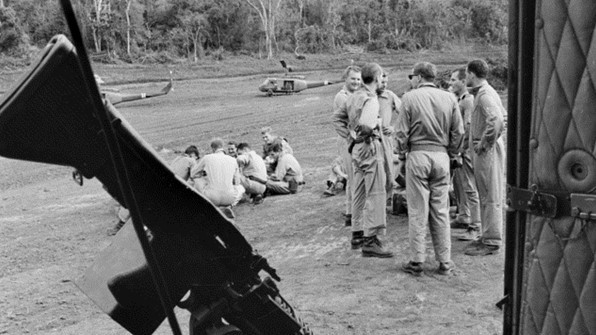
9 Sqn Troops arriving at Nui Dat (Luscombe field), waiting for the limos to take them to the motel.
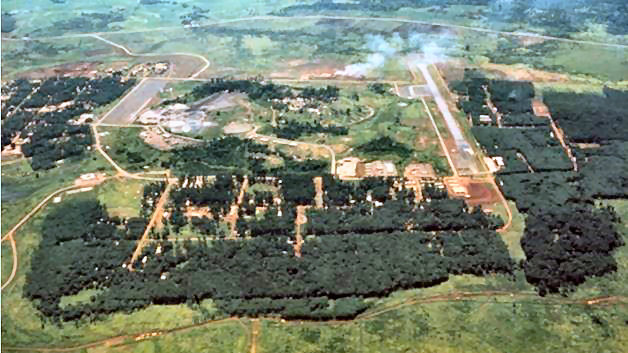
Nui Dat, with Luscombe Airfield on the right. Luscombe Airfield was named after Lt Bryan Taylor Luscombe, the first Army pilot killed in the Korean War. Work on the airstrip was started soon after the Australians arrived at Nui Dat in June 1966.
|
Working on an Iroquois helicopter of 9 Squadron at Vung is Bruce Clark, (Sumpie) who is being assisted by trainee Vietnamese mechanic Tran Van Dao. March 1968. |
|
Working on the engine of a 9 Sqn Iroquois is Ivan Ray Wescombe. April 1967.
An aerial view of helicopters from No 9 Squadron.
Siebe Van-Stam, a crewman gunner with No. 9 Iroquois helicopter Squadron.
Peter Tickner, 9 Squadron, (Framie) is checking the hydraulic union on an Iroquois. June 1969.
Paul Covington, gunner, checking his weapon before an operation. Jan 1967.
Robert Oliver, (Framie) and Roger Wilde, (Sumpie).
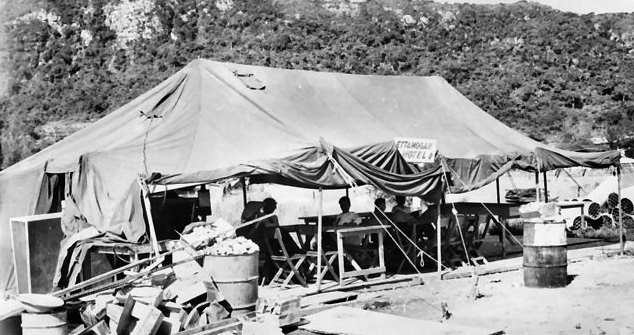
Exterior view of the partially completed 9 Squadron, Airmen's Club, (1966) colloquially known as the 'Ettamogah Hotel' after the 'Australian Post' cartoon drawn by Ken Maynard. The sign was painted by Joseph Riches, an aircraft spray painter, known amongst squadron members as 'Joe the Painter'. Sticking out from the left-hand side of the tent is the bar, which has yet to be positioned. The 'Ettamogah Hotel' was established to provide a recreation facility separate from the 35 Squadron bar and was run on a volunteer basis, wherein rostered squadron members would stock the bar with beer, Pepsi soft drink and ice purchased with their own ration tickets from the base PX store. Patrons provided their own spirits and entertainment.
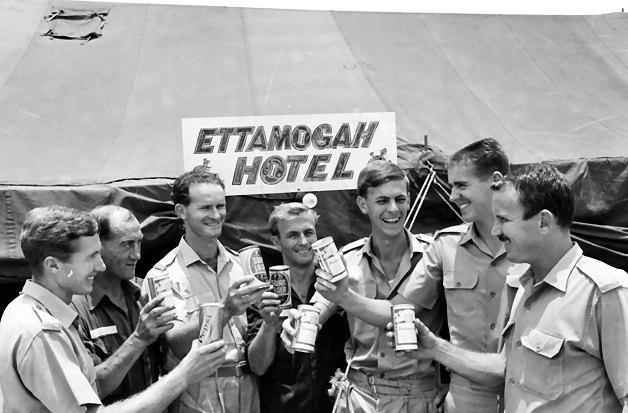
Sampling some of the local brew are L-R: Robin Gee, Douglas Bowie, Kevin Seckington, Ray Bessen, Wayne Darcy, John Florence and Kevin Devine.
Two of the Welfare boats at Back Beach.
My wife said I needed to be more in touch with my feminine side, so I crashed the car, burnt the dinner and ignored her all day for no reason.
Main Street, Phan Rang, 1966.
2 Sqn HQ, Phan Rang, 1971.
Rolf Aronsen CO 2 Sqn, and Dave Ingall (April 1967).
2 Sqn ADGs, (1971)
Standing L-R: Ian Dainer, Barry Oliver, Graham Maher, Laurance Kuchel.
Front L-R: Noel Brown, Greg Ewan, Ian Simkinson, Phil Crisp.
Peter Herbert and Kevin Conner in the tape-recording centre at Phan Rang Air Base, Vietnam. The USAF provided the tape centre as an amenity for the many airmen who have tape systems and it enables them to build up a library of taped music.
2 Sqn Dongas.
“Home” for the blokes who kept Phan Rang’s Canberras flying. The blokes at Vung Tau enjoyed similar facilities as those at Phan Rang, facilities that Army blokes at Nui Dat could only dream of.
The “Koala Bar” – the Airman’s club for blokes at Phan Rang. Dec 1970.
The opera house in the Australian quarters at Phan Rang. This structure was used to screen movies to the RAAF personnel at night.
2 Sqn Sumpies on a D service.
Pilot, FO David Smith, and navigator, FO Peter Murphy, stand next to their Canberra on which is loaded the last bomb dropped by No. 2 Squadron in Vietnam. The bomb was painted white and the armourers had printed in red the words "76,389th and last bomb compliments to Charlie from RAAF No. 2 Squadron RAAF UC Dai Loi".
Murphy was given the honour of flying the squadron's final mission as his 310 Vietnam missions with No. 2 Squadron was the Squadron's highest number of Vietnam missions.
On the 31st May 1971, the unit’s Canberras were called on to provide nine sorties over the north of South Vietnam, with the last of these taking off at 1410 to fly in support of American ground forces in the A Shau Valley. The last bomb was released at 1518. During nearly four years of operations, 2 Squadron had dropped 76,389 bombs totaling 27,158 tonnes. The squadron’s aircraft left Vietnam to return to Australia on 4 June and personnel and equipment progressively departed until mid-July. It was to be another 32 years before the RAAF again dropped a bomb in anger.
There's more info HERE.
A RAAF Squadron Leader hosing down members of 2 Squadron, who have climbed aboard the Canberra to celebrate its return to Phan Rang. It had completed the Sqn’s last bombing operation in Vietnam.
2 Sqn personnel, March 1971.
Ken Marks – radio, 2 Sqn Phan Rang, April, 1971.
Click HERE for Vol 127 of the Phan Rang news.
Growing up with a dyslexic father had its advantages.
Whenever he caught me swearing, he used to wash my mouth out with soup.
Back Go to page: 1 2 3 4 5 6 7 8 9 10 11 12 13 14 15 16 17 18 19 20 Forward
